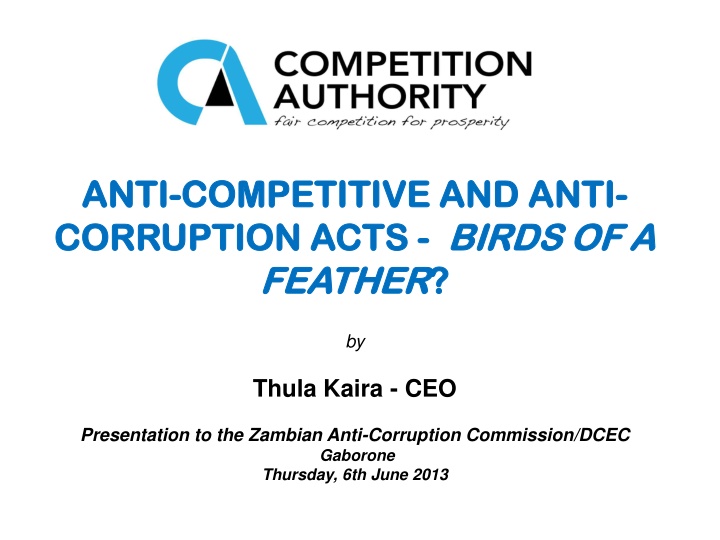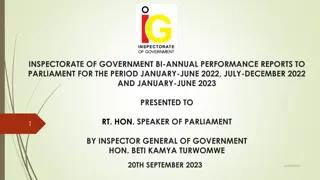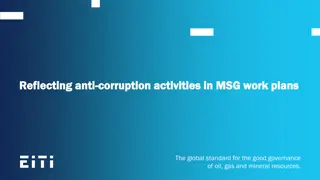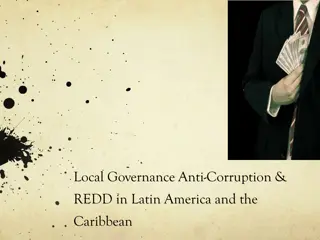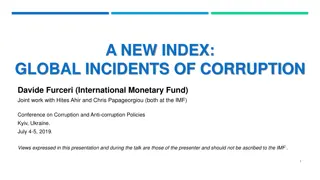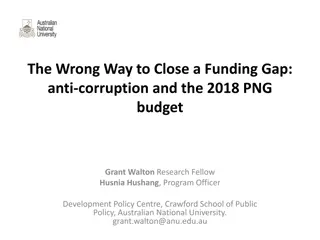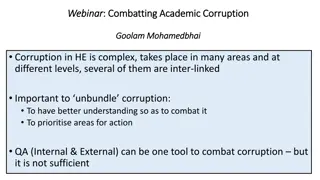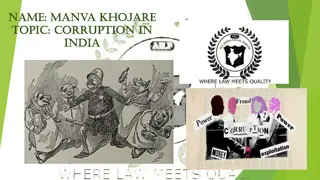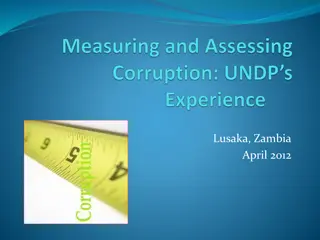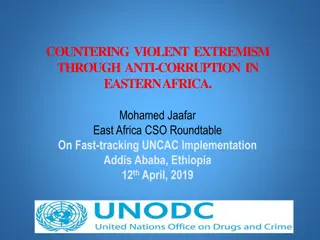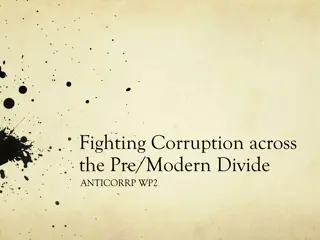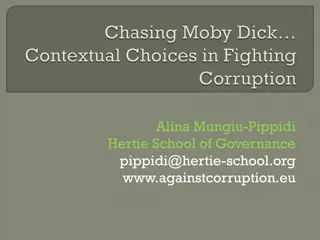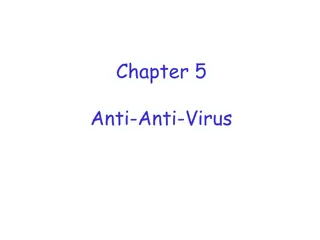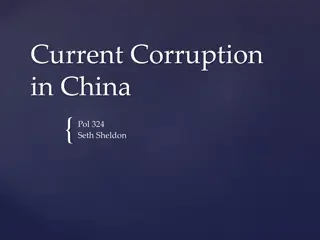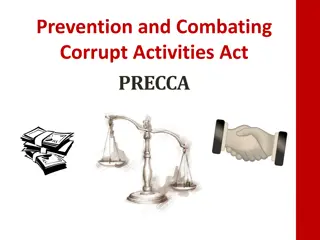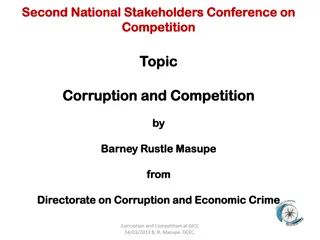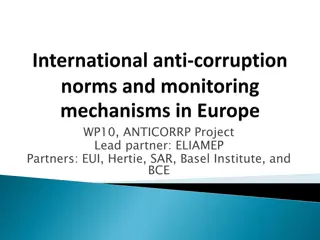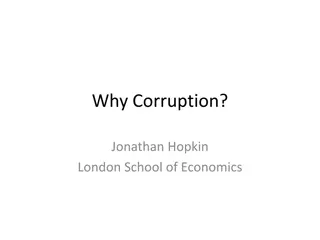Anti-Competitive Acts and Corruption - Presentation Highlights
The presentation delves into the importance of protecting competition, outlines principles of competition policy, and discusses Botswana's Competition Act. It emphasizes the detrimental impact of monopoly markets and advocates for fair business practices. The Government of Botswana's initiatives to regulate competition and combat corruption are highlighted, stressing the need for a level playing field for both local and foreign firms.
Download Presentation

Please find below an Image/Link to download the presentation.
The content on the website is provided AS IS for your information and personal use only. It may not be sold, licensed, or shared on other websites without obtaining consent from the author.If you encounter any issues during the download, it is possible that the publisher has removed the file from their server.
You are allowed to download the files provided on this website for personal or commercial use, subject to the condition that they are used lawfully. All files are the property of their respective owners.
The content on the website is provided AS IS for your information and personal use only. It may not be sold, licensed, or shared on other websites without obtaining consent from the author.
E N D
Presentation Transcript
ANTI ANTI- -COMPETITIVE AND ANTI COMPETITIVE AND ANTI- - CORRUPTION CORRUPTION ACTS ACTS - - BIRDS FEATHER FEATHER? ? BIRDS OF A OF A by Thula Kaira - CEO Presentation to the Zambian Anti-Corruption Commission/DCEC Gaborone Thursday, 6th June 2013
PRESENTATION OUTLINE 1. Introduction 2. Why we should protect competition 3. Principles of Competition Policy 4. Botswana s Competition Act 5. How we operate 6. Competition Policy & Corruption 7. Birds of a feather ?
1. INTRODUCTION The Government of Botswana through its Cabinet adopted the National Competition Policy for Botswana in July 2005 The Policy was preceded by an Economic Mapping Survey (2002) that noted high levels of unemployment, increasing dominance of foreign firms in Botswana s economy, etc
Arising from the Policy, the Government through its Parliament enacted the Competition Act in 2009 whose objectives in its preamble are to: Establish the Competition Authority Outline its mandate Regulate competition in the economy This is not unique to Botswana as such exist in over 130 countries, including BRICS, USA, EU, Egypt, Israel, Japan, Mauritius, Namibia, Zambia, Zimbabwe , etc 4
A THE Govt COMPETITION AUTHORITY IS Agency Accountable Guided By to Govt through the Minister Other over-arching National Policies
UN SET of Principles & Rules on Competition States, in their control of restrictive business practices, should ensure treatment of enterprises which is fair, equitable, on the same basis to all enterprises, and in accordance with established procedures of law. The laws and regulations should be publicly and readily available
Monopoly markets are slow to innovate and adapt to new ways of doing business A National Competition policy will assist the Government and all its agents to ensure fair business opportunities for both foreign and local firms. Competition policy & law provides a set of rules and principles that are not based on privilege but conducive to and responsive to leveled-ground or fair competition
3. PRINCIPLES OF COMPETITION POLICY Transparency Non- Procedural fairness Discrimina- tion 9
The WTO is a multilateral trade organisation that has recommended a fair, transparent and non- discriminatory multilateral trading system Botswana is a member of the WTO and has voluntarily promulgated rules of fostering fair competition in the domestic economy through the Competition Act Implementation of such a law has to adhere to the best international principles of transparency, non-discrimination and procedural fairness 10
4. BOTSWANAS COMPETITION ACT 1. Private Commercial enterprises The Law applies to: 2. The State s commercial activities 11
ELEMENTS OF THE COMPETITION ACT OF BOTSWANA ABUSE OF DOMINANCE : CARTELS: MERGERS - Price-Fixing VERTICAL AGREEMENTS : - - Excessive Pricing - Bid- Rigging/ Collusion Acquisitions - Predatory Pricing -Takeovers - Resale Price Maintenance - Market/ Customer Allocation Amalga- mations - Territorial Restraints - Tied Selling
Vertical Agreements These are agreements that businesses have from the production/supply source through logistics, wholesale/warehouse, retail ending up with the consumer What contracts, conditions, agreements, arrangements, practices are in place to move a product from manufacturing to retailing? Long-term exclusive supply contracts effectively close out new entry Transparent, fair, non-discriminatory? 13
CASE EXAMPLE Vertical Agreement Medical Aid Funders (MAFs) have entered into some form of arrangements with the Medical Service Providers (MSPs) such as dentists, gynaecologists, paediatricians etc on how much MAFs will pay for services rendered by MSPs to consumers (patients) Patients pay high monthly subscriptions to MAFs but MSPs still claim extra payments from patients invoicing system blurred Is the system pro or anti-competitive? 14
Horizontal Agreements (HAs) HAs are any manner of formally or informally coordinated common market behaviour by competitors eg banks agreeing to have uniform bank charges or bakers agreeing to sale bread at the same price HAs constitute the most serious offences in anti-trust and attract huge fines in RSA, USA and Europe. Record cement cartel fine of US$1 billion in India They create unfair-profits for the crooks 15
CASE EXAMPLE of Horizontal Agreement A group of car repair garages in Gaborone have allegedly conspired not to compete on price and so, they provide collusive quotes to insurance companies (bid- rigging/collusive tendering) They assist each other when requested with cover prices high above the normal charges Is this pro- or anti-competitive? 16
Abuse of Dominance/Monopolisation Abuse of dominance provisions are directed at enterprises which are larger in a market, which in Botswana is any firm with at least 25% market share The law prescribes conduct that dominant firms cannot engage in as the effect is more severe in a market esp. for SMEs It is important to ensure that markets have as many players as possible to provide a competitive market system 17
CASE EXAMPLE on Abuse Exploitative/excessive pricing is one form of abuse by a market player. At the Competition Authority, an IT tender produced a monopoly technical winner at P5.8 million UNDP (the funders) questioned what kind of IT infrastructure CA needed at P5.8m and requested we verify the pricing of our needs or readvertise tender Renegotiations resulted into a P2.4 million 18
Mergers and Acquisitions Mergers, takeovers, amalgamations or combination of ownership into multiple controlled and/or single firm under same hands is a way of reducing the number of players in a market, reducing competition/ choice and increasing market dominance Most competition laws thus have provisions to ensure that there is an inquiry and assessment before a proposed merger or takeover is effected in a market 19
CASE EXAMPLE of Mergers and Acquisitions G4S is the dominant player in the private security business in Botswana, with an estimated market share of over 60%. It attempted to takeover a small player with less than 5% market share (Shield Security) The CA refused to authorise the takeover as it was going to increase G4S dominance; reduce competition; and reduce consumer choice (price, service, etc) 20
5. HOW WE OPERATE CA initiates an investigation on its own or after a complaint CA can summon persons to produce evidence CA can search business premises after obtaining a court warrant CA can seek assistance of police, DCEC, PPADB, etc CA can appoint adhoc inspectors CA can cooperate with foreign CAs Competition Commission (CC) makes final decisions (except on mergers/takeovers) 21
Court of Appeal High Court The Judicial Process Competition Commission Competition Authority 22
6. COMPETITION POLICY & CORRUPTION Competition policy and law deals with both the public and the private sector While the corruption law does extend to deal with persons directly, competition law in Botswana deals with the corporate entity thus fines are meted not to persons, but to firms Competition & corruption in public service are intertwined through rent-seeking 23
Rent Seeking is spending resources in order to gain by increasing one's share of existing wealth, instead of trying to create wealth. The net effect of rent-seeking is to reduce total social wealth, because resources are spent and no new wealth is created. Rent-seeking implies extraction of uncompensated value from others without making any contribution to productivity. SOURCE: Conybeare, John A. C. (1982). The Rent-Seeking State & Revenue Diversification, World Politics, 35(1): 25-42 http://en.wikipedia.org/wiki/Rent-seeking 24
In our society, rent-seeking reduces competition and breeds corruption the moment competition is frustrated/reduced Rent seeking is higher where there are limited opportunities for growth/ wealth creation A lax public officer who is a sole decider or has discretionary authority in a key process may create a loophole for rent-seeking activities e.g., use of agents in immigration or customs clearance 25
Concepts related to rent-seeking that may reduce competition and breed corruption are: Lobbying for tariffs to be imposed on imported products to protect local competitors Introduction & processing on import permits Regulatory capture State-capture by strong interest groups who may influence policy & funding pertains 26
The economists natural approach to corruption control is to appeal to the concept of competition as it is argued that bribes are harder to sustain where perfect competition prevails a way to reduce corruption is to introduce competition at the level of the official receiving bribes: When a bureaucrat dispense a scarce benefit, the existence of competing officials to reapply in case of being asked for a bribe will bid down the equilibrium amount of competition SOURCE: Rose-Ackerman, Susan. Corruption: A study of political economy. New York: Academic Press, 1978 (as quoted by Alberto Ades and Rafael Di Tella, Rents, Competition and Corruption, The American Economic Review, Vol. 89, Issue 4 (Sep., 1999), 982-993 http://www.people.hbs.edu/rditella/papers/AER- Rents%26Corruption.pdf 27
An economic system based on the rule of law and fair competition can only function well, if trust accompanies contracts, i.e. if economic actors can calculate risks and probabilities attached to events and outcomes in the future. A high intensity of corruption induces an additional uncertainty and hence not only affects distortion of competition. 28
Also, in a corrupt society, pressure groups might try to prevent enactment of a law that could control as much as restrict their own activities. Hypothesis... A high level of corruption reduces the probability of enactment of a competition law. SOURCE: Factors accounting for the enactment of a competition law an empirical analysis, Report by Franz Kronthaler, Johannes Stephan, September 2005, Halle Institute for Economic Research 29
Where monopoly/oligopoly control a market, the State may wish to engage private companies to perform specific tasks or public works or provide services. To the extent that only a very small number of companies can practically carry out the work, the ground is fertile for corrupt practices (such as overcharging, providing low- quality work or delivering the work late). Such a condition obtains, eg, in defence projects SOURCE: United NationsCRIME PREVENTION AND CRIMINAL JUSTICE DIVISION, United Nations action againstCORRUPTIONand BRIBERY, September 1997 http://www.uncjin.org/Documents/corrupt.htm 30
7. BIRDS OF A FEATHER? Both competition and anti-corruption policies relate to good economic governance and curbing unholy advantage Both lead to loss of competitiveness in an economy as unworthy people gain in commerce and industry Information sharing and assistance in investigations by enforcement agencies should thus be a national interest issue Formalisation of cooperation through MoUs 31
KE A LEBOGA FOR FURTHER INFORMATION: Thula Kaira - CEO Competition Authority Plot 50664, Fairgrounds Private Bag 00101 Gaborone, BOTSWANA Tel: +267 393 4278 Fax: +267 312 1013 Thula.Kaira@competitionauthority.co.bw EMAIL: Thula.Kaira@competitionauthority.co.bw CA@competitionauthority.co.bw CA@competitionauthority.co.bw www.competitionauthority.co.bw WEBSITE: www.competitionauthority.co.bw FACEBOOK: Competition Authority Botswana TWITTER: @CompetitionBots
